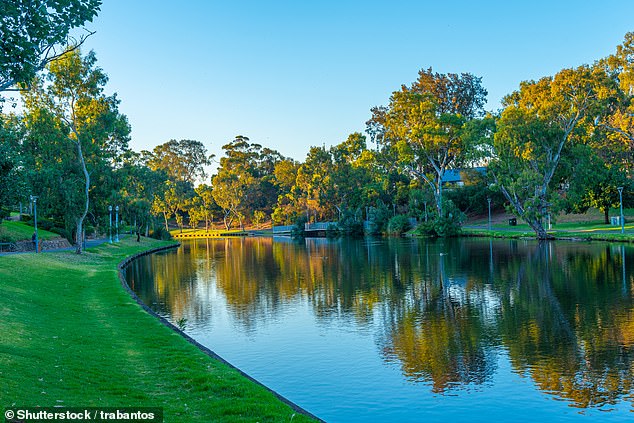Urgent health warning as bacteria that causes Bali Belly symptoms is detected in major river just days before families gather for New Year’s Eve
Aussies have been urged to stay away from the Torrens River in Adelaide’s CBD after high levels of e-coli bacteria were discovered just days before New Year’s Eve fireworks take place here.
The tens of thousands of people who usually gather at the water’s edge to watch the fireworks on New Year’s Eve may be forced to make alternative plans until e-coli levels in the great river reach safer levels.
‘Closed’ signs were placed around Torrens Lake – the part of the river between the CBD and Adelaide Oval – on Christmas Day, warning residents that the water was ‘polluted’ and that they should ‘avoid contact’.
The Adelaide Park Lands Association said on Boxing Day there had been no update from the City of Adelaide council on the duration of the ban.
“Popeye boats (a river pleasure cruise) will continue to operate as passengers are unlikely to come into contact with the water,” the social media post said.
‘Paddle boats DO NOT sail. We are told that the contamination is due to e-coli bacteria, and not blue-green algae.’
Escherichia cold (E-coli) is a common cause of Bali belly, also known as traveler’s diarrhea, and is spread when contaminated food or water is consumed.
It is understood further tests will be carried out on Friday to find out how to fix the problem and whether the river can be declared safe before New Year’s Eve.
On Christmas Day, ‘Closed’ signs were quietly placed around Torrens Lake, warning residents that the water was ‘polluted’ and that they should ‘avoid contact’ (pictured)

The River Torrens (pictured) is the main waterway running through Adelaide and is popular with tourists and locals alike for rowing and kayaking
The Torrens River is the main waterway running through Adelaide and is a popular destination for rowing and kayaking.
In previous years the river has been hit by a bloom of toxic blue-green algae.
But since 2013, a team of experts have been monitoring algae levels and preventing outbreaks by releasing a new stream of water upstream.
Daily Mail Australia has contacted the council for comment.
